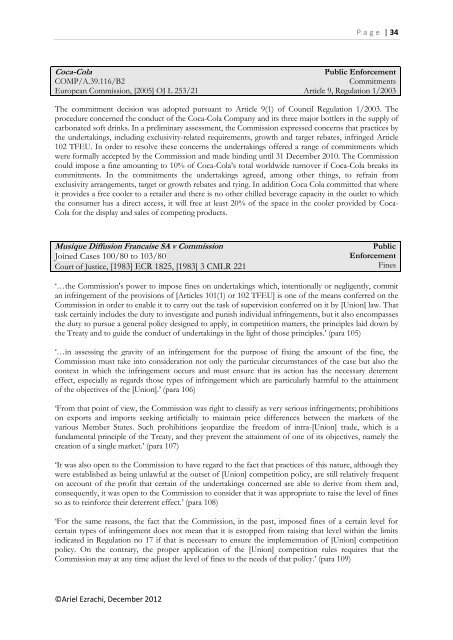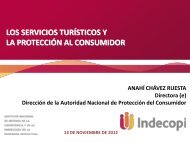EU Competition Law and Policy - compal
EU Competition Law and Policy - compal
EU Competition Law and Policy - compal
Create successful ePaper yourself
Turn your PDF publications into a flip-book with our unique Google optimized e-Paper software.
Coca-Cola<br />
COMP/A.39.116/B2<br />
European Commission, [2005] OJ L 253/21<br />
©Ariel Ezrachi, December 2012<br />
P a g e | 34<br />
Public Enforcement<br />
Commitments<br />
Article 9, Regulation 1/2003<br />
The commitment decision was adopted pursuant to Article 9(1) of Council Regulation 1/2003. The<br />
procedure concerned the conduct of the Coca-Cola Company <strong>and</strong> its three major bottlers in the supply of<br />
carbonated soft drinks. In a preliminary assessment, the Commission expressed concerns that practices by<br />
the undertakings, including exclusivity-related requirements, growth <strong>and</strong> target rebates, infringed Article<br />
102 TF<strong>EU</strong>. In order to resolve these concerns the undertakings offered a range of commitments which<br />
were formally accepted by the Commission <strong>and</strong> made binding until 31 December 2010. The Commission<br />
could impose a fine amounting to 10% of Coca-Cola’s total worldwide turnover if Coca-Cola breaks its<br />
commitments. In the commitments the undertakings agreed, among other things, to refrain from<br />
exclusivity arrangements, target or growth rebates <strong>and</strong> tying. In addition Coca Cola committed that where<br />
it provides a free cooler to a retailer <strong>and</strong> there is no other chilled beverage capacity in the outlet to which<br />
the consumer has a direct access, it will free at least 20% of the space in the cooler provided by Coca-<br />
Cola for the display <strong>and</strong> sales of competing products.<br />
Musique Diffusion Francaise SA v Commission<br />
Joined Cases 100/80 to 103/80<br />
Court of Justice, [1983] ECR 1825, [1983] 3 CMLR 221<br />
Public<br />
Enforcement<br />
Fines<br />
‘…the Commission's power to impose fines on undertakings which, intentionally or negligently, commit<br />
an infringement of the provisions of [Articles 101(1) or 102 TF<strong>EU</strong>] is one of the means conferred on the<br />
Commission in order to enable it to carry out the task of supervision conferred on it by [Union] law. That<br />
task certainly includes the duty to investigate <strong>and</strong> punish individual infringements, but it also encompasses<br />
the duty to pursue a general policy designed to apply, in competition matters, the principles laid down by<br />
the Treaty <strong>and</strong> to guide the conduct of undertakings in the light of those principles.’ (para 105)<br />
‘…in assessing the gravity of an infringement for the purpose of fixing the amount of the fine, the<br />
Commission must take into consideration not only the particular circumstances of the case but also the<br />
context in which the infringement occurs <strong>and</strong> must ensure that its action has the necessary deterrent<br />
effect, especially as regards those types of infringement which are particularly harmful to the attainment<br />
of the objectives of the [Union].’ (para 106)<br />
‘From that point of view, the Commission was right to classify as very serious infringements; prohibitions<br />
on exports <strong>and</strong> imports seeking artificially to maintain price differences between the markets of the<br />
various Member States. Such prohibitions jeopardize the freedom of intra-[Union] trade, which is a<br />
fundamental principle of the Treaty, <strong>and</strong> they prevent the attainment of one of its objectives, namely the<br />
creation of a single market.’ (para 107)<br />
‘It was also open to the Commission to have regard to the fact that practices of this nature, although they<br />
were established as being unlawful at the outset of [Union] competition policy, are still relatively frequent<br />
on account of the profit that certain of the undertakings concerned are able to derive from them <strong>and</strong>,<br />
consequently, it was open to the Commission to consider that it was appropriate to raise the level of fines<br />
so as to reinforce their deterrent effect.’ (para 108)<br />
‘For the same reasons, the fact that the Commission, in the past, imposed fines of a certain level for<br />
certain types of infringement does not mean that it is estopped from raising that level within the limits<br />
indicated in Regulation no 17 if that is necessary to ensure the implementation of [Union] competition<br />
policy. On the contrary, the proper application of the [Union] competition rules requires that the<br />
Commission may at any time adjust the level of fines to the needs of that policy.’ (para 109)



